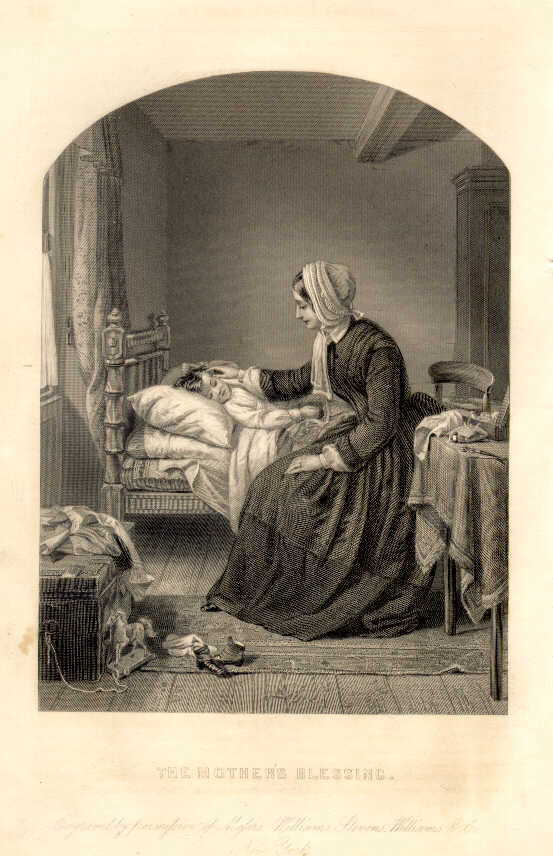To Mother
May 8th, 2011
Mother’s Day, as we know it, was declared a holiday in 1870 by Julia Ward Howe, who grew up not far from where I live and is best known for writing “The Battle Hymn of the Republic.” She originally set the date in June. But odes upon the importance of motherhood are as old as time itself. Here are a couple of gems, complete with illustration, from Godey’s Lady’s Book.
WE do not hear much of the mothers of great men. What their fathers were— what their reputation, qualities, and history— is related to us with great particularity; but their mothers are usually passed over in comparative silence. Yet it is abundantly proved, from experience, that, the mother’ s influence upon the development of the child’s nature and character is vastly greater than that of a father can be. “The mother only,” says Richter, “educates humanly. Man may direct the intellect, but woman cultivates the heart.” — Godey’s Lady’s Book, May 1854
THE MOTHER’S BLESSING
“MY mother ! my first, best friend! As I sit here, looking far back into the past, I can trace in every act that did me credit the influence of her love her tender care; and on every unworthy deed I seem still to see the sad, grieved face, the brimming eye, and, quivering lip she bent over me, trying, by sweet, winning love, to bend my stubborn will; and make me regret the act that caused her so much sorrow. Surely, the best gift in our heavenly Father’s sending is mother’ s love.” — Godey’s Lady’s Book, Mary 1858
Happy Mother’s Day!


Ah! A bit of proto-feminism from Godey’s… how lovely (and true)!
Relatedly, I was just having a discussion with M. the other day, at how in a marriage (or civil union) partnership, the accomplishments of one partner should most times properly be considered the accomplishments of both. I think if we fully and seriously considered the unsung work of women, then many of the world’s great books would be more correctly authored as “The Milton Family,” or “The Machiavellis,” &tc &tc. The family functioned as a unit, and it seems a bit untruthful to cut off acknowledgement to only one member, just because there was a division of labor.
I think I. and I have had the same discussion! He’s fond of telling the story (not sure if it is true or a French film) of a famous composer whose wife actually wrote all of his symphonies…but truly, 19th-century women should receive credit for inspiring and abetting their husbands’ efforts, even where they weren’t doing the actual work themselves. One case where the opposite was true I think was Mrs. Beeton, whose famous cookbook was mostly written by her husband, especially the later editions, all published after her death…